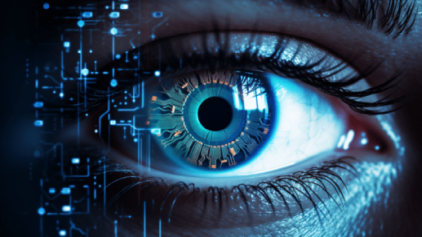In a recent blog post, Bay Leaf Digital set out to help you explain Software as a Service to anyone outside the industry. You can’t talk about SaaS without understanding artificial intelligence, so today we’re going to do the same for AI. The stories in the news are inescapable and AI is dominating headlines. The people around you probably have questions. Bay Leaf Digital is here to help you with easy answers that anyone can understand.
What Is Artificial Intelligence?
Artificial Intelligence (AI) refers to the development of computer systems that can perform tasks that typically require human intelligence, such as:
-
- visual perception
- speech recognition
- decision-making
- language translation
In simple terms, it’s about creating machines that can think and learn like humans. The goal of AI is to create systems that can solve problems and complete tasks in a way that mimics human intelligence and decision-making processes. With AI, machines can perform tasks more quickly, accurately, and efficiently than humans, allowing us to tackle complex problems and achieve new levels of efficiency and productivity. From Siri on our smartphones to text generators that can write term papers and self-driving cars on the road, AI is becoming increasingly prevalent in our daily lives. Once confined to science fiction, artificial Intelligence (AI) is now reality. It’s a rapidly growing field that will revolutionize the way we live and work.
What Are Other Ways That People Use AI?
Artificial intelligence is widely used in a variety of medical applications, including in the diagnosis and treatment of diseases. AI algorithms can analyze medical images, such as X-rays and MRIs, to identify signs of disease and provide recommendations for treatment. AI systems can also analyze vast amounts of patient data to identify risk factors for various conditions, allowing healthcare providers to take a more proactive approach to patient care. For example, an AI system might analyze data from wearable devices, such as fitness trackers, to identify patterns that could indicate the early onset of a disease, such as heart disease or diabetes.
In addition to business and medical applications, AI is also being used in our homes to make our lives easier. For example, voice-activated virtual assistants, such as Amazon’s Alexa and Google’s Home, can perform a wide range of tasks, from playing music and setting reminders to controlling lights and temperature. AI-powered home security systems can also use machine learning algorithms to identify potential threats and alert homeowners, providing an extra layer of protection.
AI is even having an impact on childhood. The UNICEF Office of Global Insight and Policy says, “AI systems are fundamentally changing the world and affecting present and future generations of children. Children are already interacting with AI technologies in many different ways: they are embedded in toys, virtual assistants, video games, and adaptive learning software. Algorithms provide recommendations to children on what videos to watch next, what news to read, what music to listen to and who to be friends with.”
“Our intelligence is what makes us human, and AI is an extension of that quality. Artificial intelligence is extending what we can do with our abilities. In this way, it’s letting us become more human.” – Yann LeCun

Understanding Artificial Intelligence and Its Effect on Business
While the benefits AI’s impact on everyday life are still being discussed, there’s one fact that’s not up for debate: artificial intelligence is having an impact on business. The companies that catch this wave now are those that will benefit most in the long run. According to a recent study by Accenture, AI has the potential to boost profitability by 38% in the next ten to fifteen years.
Businesses around the world are already using artificial intelligence to help improve operations, increase efficiency, and enhance customer experiences. One of the most significant applications of AI in business is in customer service. Companies are using chatbots powered by AI to answer customer inquiries, resolve issues, and provide support. This not only saves time and resources but also provides a more personalized experience for the customer. For example, an insurance company might use an AI-powered chatbot to answer frequently asked questions, such as “What is my policy number?” or “When is my next payment due?” The chatbot can respond to these inquiries in real-time, 24 hours a day, 7 days a week, providing customers with a convenient and efficient way to get the information they need.
Another area where AI is having tremendous impact is in marketing and advertising. AI algorithms can quickly and efficiently analyze vast amounts of data to identify patterns and insights, informing marketing strategies and improve targeting. For example, an AI system might analyze customer data to determine which products are most popular among a particular demographic, allowing a company to better target its advertising efforts and increase sales. AI is also being used to create personalized experiences for customers, such as targeted advertisements and product recommendations based on their browsing and purchasing history.
Professional copywriters are using text-generating AI such as headline-generating Chat GPT to make their jobs easier by leveraging its capabilities for tasks such as research, writing, and editing. AI algorithms can quickly gather and analyze vast amounts of information on a given topic, instantly updating copywriters on the latest trends and developments. Additionally, AI-powered writing tools can generate draft copies of articles and marketing materials, reducing the time and effort needed to research and write. These tools can also analyze text for grammar, tone, and style, helping copywriters to produce polished, error-free pieces that are in line with their clients’ goals and objectives. By using AI, marketing departments can focus on the creative aspects of their work and deliver high-quality content in less time. At Bay Leaf Digital, we believe that the best way to use AI for content marketing is with a hybrid system, employing digital technology to generate a draft and then manually polishing and improving it. Remember that AI can only generate text – it can’t verify facts or confirm quotes. That still requires human intelligence.
As technology continues to evolve and become more advanced, the possibilities for AI are nearly endless. The key for businesses and individuals alike is understanding artificial intelligence and finding ways to use it to enhance their lives and work.
Does your SaaS business need help clarifying its message and telling its story? The Bay Leaf Digital team is ready to lend a hand. Begin a conversation with us today.


